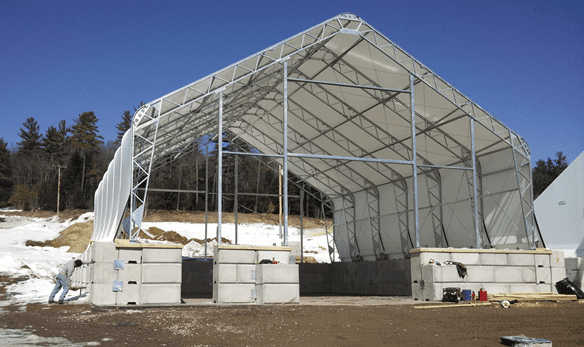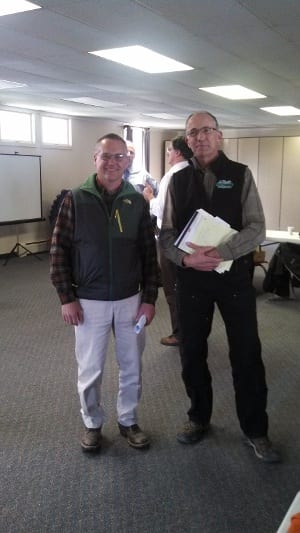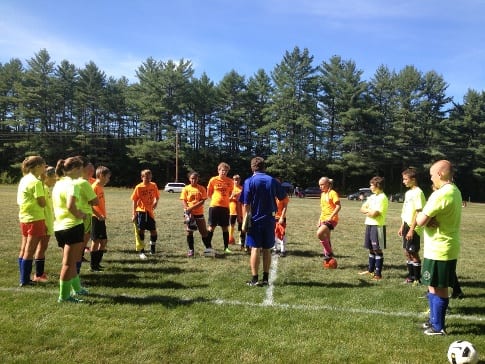RMI is pleased to announce tremendous improvements at our New Hampton facility; two new buildings are under construction. Still under way in some aspects, the structures have been completed and doors have been put on—all we wait for now is for the floors to be poured and drainage system assembled! This is an exciting accomplishment for the site. With these buildings in place, the next plan of action is to do all the mixing and loading of our materials indoors, a much better and careful approach to the procedure. Site Manager Wayne Shirkey, as well as the rest of the RMI team, is very eager for the completion of the project to really get things rolling!
Earth Day 2014
As part of our annual Earth Day program RMI continues to support local community gardens. This year’s program partner is the Sycamore Community Garden in Concord, NH. Read an article on the project, featured in The Citizen newspaper, below. We’re excited to hear from the gardeners later this summer as they Watch It Grow!
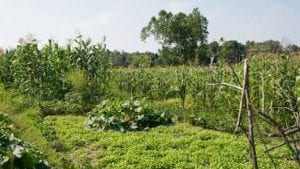
Sycamore Community Garden, Concord, New Hampshire (Credit FieldWork Photos)
Lending a helping hand
RMI of Holderness donates wood ash to Sycamore Community Garden
HOLDERNESS — For the last 20 years, Resource Management, Inc. has been devoted to the land and the people that they serve through providing organic residuals and recycling services. As part of an Earth Day program, the company will be donating wood ash to the Sycamore Community Garden in Concord, which helps refugees and people in financial hardship.
“Earth Day really is every day for us at RMI,” said RMI Office Manager Jessica Bunker, who oversees the Earth Day program. “Our whole mode of operations is through recycling and working with local resources like this.”
Bunker explained that the program is in its second year, with last year benefiting the Plymouth Community Garden and the Plymouth Elementary School. In the inaugural year, Bunker began working with the New Hampshire Farm to School Program, and also started looking for community gardens to work with. She utilized the University of New Hampshire Cooperative Extension, which Bunker said has been a great tool for the program, as it has an interactive map of community gardens around the state.
This year, Bunker chose the Sycamore Community Garden, which is located at the New Hampshire Technical Institute. Bunker said that it not only stays within the company’s mantra of recycling by-products like wood ash, but will also feed those in need.
“I love this kind of story because we are not only helping locals through a food program, but also helping low-income refugees,” Bunker said. “These are people who really need this food.”
Bunker explained that Sycamore Community Garden has been successful for many years, with 138 garden plots, but it has more demand than it can supply. The plots are used by refugees from a variety of nations for a nominal fee. If they can’t pay, the money is found through the community.
“This gets them fresh, local produce without going to the store,” Bunker explained.
RMI would normally sell the wood ash to area farmers, but for this program, they will bring a smaller-sized load to Concord. Bunker said that they usually deliver wood ash in tons, but due to the size of the plot, the delivery will be much smaller. In this case, there will be 5 gallons of wood ash used per plot.
Bunker said that soil samples were taken to ensure the soil needs pertain to the wood ash provided. The wood ash is a by-product that comes from New Hampshire biomass carriers. She explained that essentially, wood chips are burned to create energy, and the by-product is the wood ash.
There are several power plants throughout the state that burn trees to generate electricity. Heat from the burning wood makes steam, and the steam turns turbines that create the electricity. After the wood is burned, there is a large amount of wood ash left over. It is similar to ash from wood stoves in homes.
This is a process that has been done for more than two decades, and the wood ash by-product is normally used by farmers to help grow their crops. It is used to improved topsoil for local gardens, as well as organic compost.
Bunker said that New Hampshire is notorious for having sandy soil that misses nutrients than many plants need, which is where the wood ash comes in. Farmers add this and other fertilizers to soil to allow plants to get the nutrients they would otherwise be without. It is also less expensive than other fertilizers, and farmers save about $40 per acre in comparison to commercial fertilizers or lime.
The wood ash being distributed is certified organic by the Organic Materials Review Institute, Bunker said. She said that this system is great for the local economy as well as the environment.
“It’s really a win-win for the community,” Bunker said.
Cheryl Bourassa, manager of the Sycamore Community Garden, said that the program benefits greatly by any contribution, such as the one by RMI.
“The basic premise behind this garden is making gardening available to low-income families,” Bourassa said. “In this case, which is pretty unique, it is open to any low-income resident, but many are refugees. It allows for a comfort in numbers with people who speak their language. It’s also a chance for them to grow vegetables that are part of their culture.”
Bourassa said that popular vegetables currently being grown are hot peppers, okra, eggplant, and tomatoes.
The Sycamore Community Garden Project was established in 2009, according to Bourassa. Prior to this, Concord’s only community garden was located off of Clinton Street, which is far from bus routes and without access to water.
Since 1999, Bourassa explained, there have been hundreds of refugee families that have moved to the state’s capital. Many had a history of agricultural work in their home lands as well as refugee camps. With them they brought a desire to grow their own food, but many cannot afford to purchase land. The community garden alleviates this problem for many, as it allows them to have economic independence as well as work to support their families during a time where jobs can be hard to find.
The garden plots are 13 feet by 27 feet, and cost about half of what is usually charged for community gardens. She said that the people using them are efficient and tend to use every inch. There is an on-site gazebo where tools are stored, which the gardeners share so they will not need to spend money on equipment, which is all obtained through donations. She said that water is drawn from a nearby oxbow pond, and churches, clubs, and nurseries are asked for donations of seeds and seedlings.
“This garden can be so important for these families’ well-being,” Bourassa said.
Bourassa said that some people have already started planting their vegetables, as some need more time to do so. On May 1, which coincides with a lottery for six plots at the garden, the wood ash will be delivered via truck by RMI and left for people, along with literature with agronomic recommendations. Bunker said the wood ash can either be used as a top dress, sprinkled on, or mixed into the soil.
RMI Senior Project Manager Charley Hanson explained that 20 years ago, he started the company, along with President Shelagh Connelly and Vice President Martin Riehs, with a desire to continue organic recycling throughout the region. Before the Earth Day program, RMI gave back to community gardens in places like Boscawen and Ashland. Hanson said that it was their goal to create a company that could give back to the region.
“We feel that it is important to give back,” Hanson said. “It fulfills the green initiative.”
Biosolids, A First In A Love Story?

Joe Monninger reads an excerpt from his most recent novel Margaret from Maine
The use of biosolids fertilizer is usually discussed in agricultural journals and scientific papers, rarely, if ever, is the the term biosolids used in a novel … until now. Set on a farm in rural Maine, Margaret from Maine by local author Joe Monninger depicts day-to-day life on a New England dairy including the maintenance of the property’s soil health. Like many real-life farmers, the Kennedy family depicted in Monninger’s novel is considering biosolids as an economically feasible alternative to commercial fertilizer. As the Kennedys learn from their state extension agent, biosolids are high in organic matter and micro-nutrients essential for hardy plant growth.
Watch our video Biosolids, A First In A Love Story? to learn more about Joe Monninger, how he realistically portrays the story’s agricultural setting and why he chose to mention biosolids in his latest novel!
Reducing RMI’s Carbon Footprint
RMI is New Hampshire’s only Tier 3 Gold Level organization recognized by the National Biosolids Partnership’s Environmental Management System program. By participating in this program, RMI has commited to the NBP’s Code of Good Practice pledging to uphold principles of conduct including Quality Practices as well as Sustainable Management Practices and Operations.
As part of RMI’s 2013 EMS Management and Quality goals and objectives, we decided to purchase a new Trinity trailer with an on-board scale. Having an on-board scale will improve RMI’s efficiency, reducing the amount of time and fuel spent driving to a scale house for weighing. The new trailer will provide us with on-site, real-time data and will help reduce our carbon footprint!
2013 Vermont Biosolids Forum
Over 80 participants attended the Vermont Biosolids Forum in 2013 held by the Vermont Department of Environmental Conservation in Waterbury, Vermont today. Among the attendees was 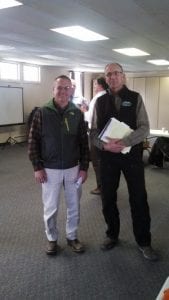 Lorenzo Whitcomb, photo left, a Vermont dairy farmer. Lorenzo imparted his experience using biosolids as an alternative fertilizer sharing a letter he had written to his neighbors when he first began applying biosolids to his fields. The letter read as follows,
Lorenzo Whitcomb, photo left, a Vermont dairy farmer. Lorenzo imparted his experience using biosolids as an alternative fertilizer sharing a letter he had written to his neighbors when he first began applying biosolids to his fields. The letter read as follows,
To: Our Essex Neighbors
From: Whitcomb Family Farm
Date: August 20, 2009
Re: Use of Local Biosolids as Fertilizer
We are writing to share some information about our dairy farm and the proposed use of biosolds as fertilizer to grow livestock feed.
About six years ago we approached Jim Jutras of the Essex Junction Waste Water Treatment Plant about using Essex biosolids as fertilizer on our farm. At the time, the biosolids were being trucked to Canada.
We currently farm in two locations, Essex Junction and North Williston. Our milking herd is in Williston and our young stock in Essex. The cows at our Essex Farm don’t make enough manure to fertilize all the crops. We are currently relying on commercial fertilizer to supply our additional needs. The idea of using a safe locally produced fertilizer is very appealing both economically and as a community service. Keeping any farm sustainable involves keeping the soil nutrients at optimum levels and not depleting the nutrient levels of the soil. We have the experience and equipment to handle the biosolids in a timely and environmentally safe way.
Whitcomb Farm has previously used biosolids with very good results. The biosolids would be used for cow crops only. The biosolids and groundwater will be tested by the Village of Essex Junction and the soil testing will be done by Whitcomb Farm’s private crop consultant.
Since Whitcomb Farm will be applying the biosolids, we will adhere to all setbacks and site criteria. Biosolids would be tilled into the soil after application.
Biosolids will come exclusively from the Essex Junction Waste Water Treatment Plant. In no way should treated biosolids be mistaken as raw sewage.
Lorenzo Whitcomb
Also included at the forum were presentations on the recycling of biosolids and the land application of biosolids. Learn more about RMI’s biosolids soil amendments here.
Pemi Baker Soccer Club Celebrates its New Home
The Pemi Baker Soccer Club is enjoying their first season on a home field built by Resource Managment, Inc. (RMI). What once was a Christmas tree stand and pumpkin patch has been transformed into a FIFA regulation-sized field for the Pemi Baker Soccer Club, located just two miles north of the Holderness School on Route 175.
RMI donated the resources to build the Pemi field for the soccer club using Heart & Soil® NutraSoil, an engineered topsoil designed for rugged use on athletic fields, for this project. RMI is committed to its community, creating a home field for the local soccer team was a great way to give back.
The Pemi Baker Soccer Club is a non-profit promoting players in grades 2-6 from Ashland, Plymouth, Holderness, Campton, Thornton, Rumney, Wentworth, Warren, and Waterville Valley, and also sponsors travel teams. This fall there are three travel teams and all are looking like they will make it to the finals.
Read the feature article on the Pemi Baker Soccer Field from the Plymouth Record Enterprise here.
